Searching for how you are protected as a consumer in Montana? This article provides an overview of Montana’s consumer protection laws and resources available to ensure your rights are upheld, including important information on consumer protection Montana. Learn about key protections, how to file complaints, and what resources are available to support you.
Key Takeaways
- Montana consumers are protected by specific laws designed to prevent deceptive practices and ensure fair treatment in the marketplace.
- The Montana Department of Justice, particularly the Office of Consumer Protection, plays a vital role in upholding consumer rights and addresses fraudulent activities.
- Residents are encouraged to educate themselves about their rights and available resources, such as legal aid services and complaint filing processes, to protect against consumer fraud.
Understanding Consumer Protection Laws in Montana
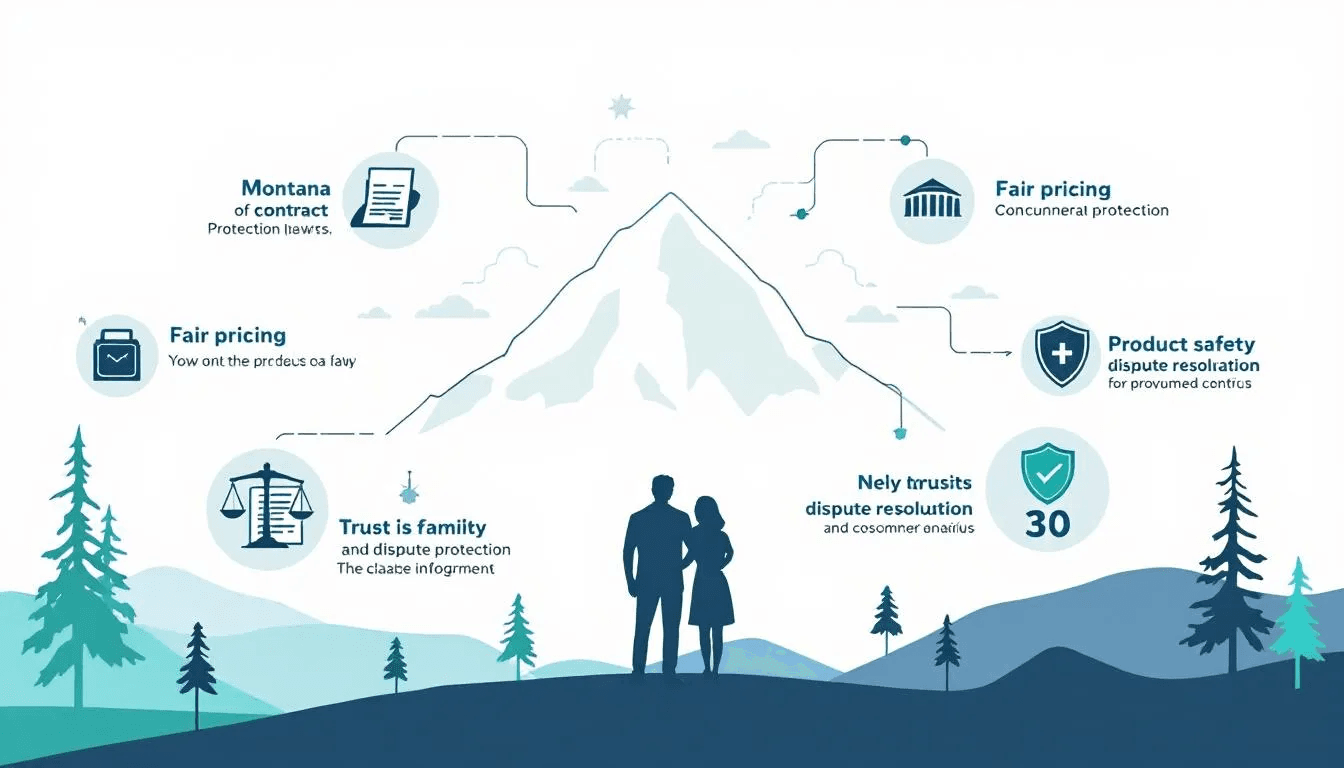

Consumer protection laws in Montana are designed to ensure fair treatment for consumers and to prevent deceptive practices that could harm them. These laws provide a safety net, offering various resources and programs aimed at empowering Montana consumers to understand their rights and access necessary assistance. Residents need to be well-versed in these protections to navigate the marketplace confidently and securely.
The Montana attorney general oversees the enforcement of consumer protection laws in the state, ensuring that businesses comply with regulations and that consumers are protected from unfair or deceptive practices.
Montana offers multiple channels through which consumers can learn about their rights and advocate for themselves. Various organizations and programs are dedicated to protecting consumer rights and providing assistance when needed. Understanding these laws is the first step towards safeguarding oneself from unfair business practices and making informed decisions.
The Montana Unfair Trade Practices and Consumer Protection Act
The Montana Unfair Trade Practices and Consumer Protection Act is a cornerstone statute of consumer protection in the state. This act prohibits unfair or deceptive acts and practices in the conduct of any trade or commerce. It is designed to ensure that businesses cannot make misleading claims about their products and services, thereby protecting consumers from being deceived. For instance, advertising must be truthful and should not misrepresent the quality or benefits of a product, as mandated by this act.
Fair advertising practices are vital for maintaining consumer trust and a competitive marketplace. Businesses must adhere to these regulations by presenting their products and services honestly and avoiding any deceptive claims that could mislead consumers.
Enforcing these standards helps create a fair and transparent market environment under the Montana Consumer Protection Act.
Key Rights Under Montana Consumer Protection Laws
Montana consumers have several key rights under the state’s consumer protection laws. When entering into a contract for goods or services, consumers have the right to clear terms and protections against unfair contract provisions. One of the most fundamental rights is to receive truthful information about goods and services before making a purchase. Additionally, consumers are entitled to a full refund for goods that are defective or misrepresented.
Educational initiatives in Montana inform consumers about their rights and how to navigate financial and legal challenges. Programs on financial literacy and legal rights empower consumers to make informed decisions and protect themselves from unfair practices.
Role of the Montana Department of Justice in Consumer Protection
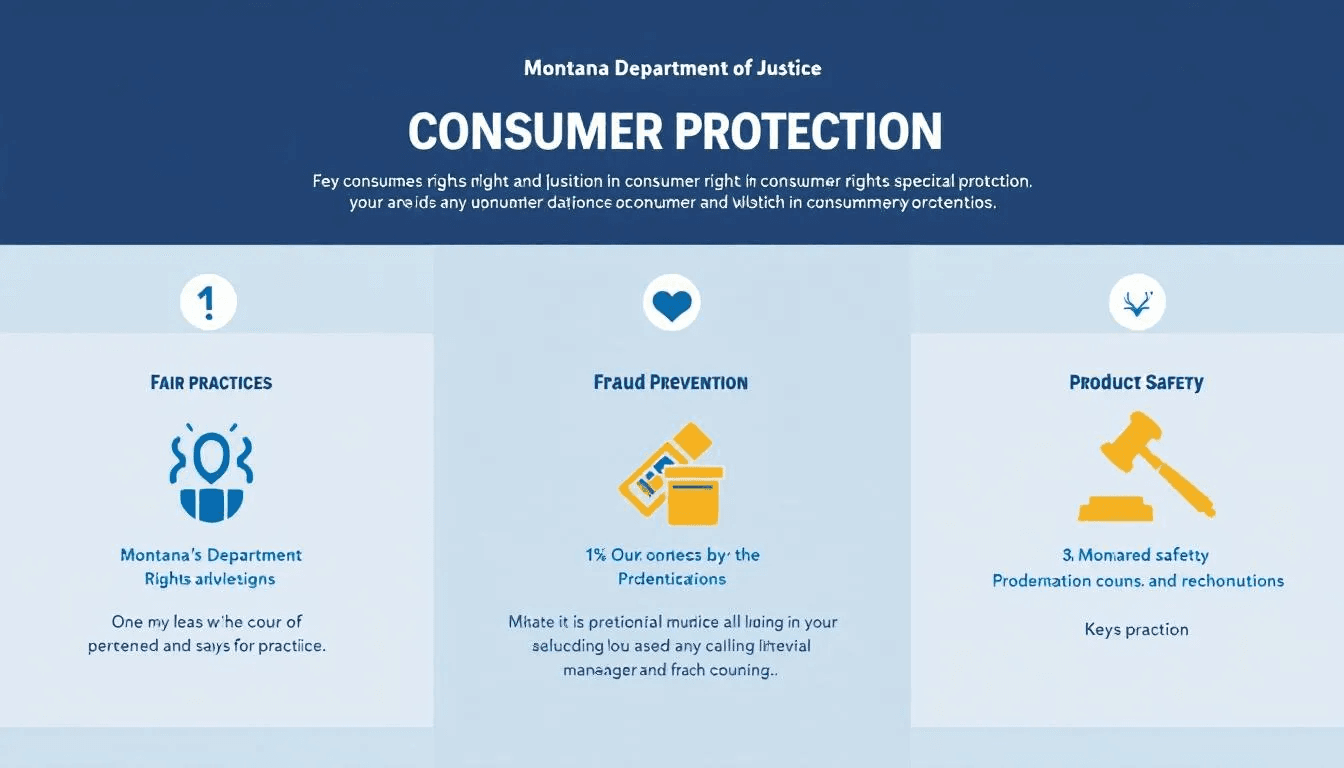

The Montana Department of Justice plays a pivotal role in enforcing consumer protection laws and ensuring that consumers are treated fairly. The department is responsible for the enforcement of consumer protection statutes, investigating violations, and taking legal action against businesses or individuals who break these laws. This department:
- Oversees the implementation of various initiatives aimed at educating the public about their rights
- Safeguards consumers from fraudulent activities
- Conducts proactive measures like awareness campaigns and outreach programs
- Works tirelessly to prevent consumer fraud and maintain a fair marketplace.
The Montana Department of Justice also collaborates with other agencies to address consumer issues on a larger scale, including various gov initiatives. These efforts uphold marketplace integrity and provide a safety net for consumers who might otherwise fall prey to deceptive practices.
The work done by the Montana Department of Justice is crucial in maintaining consumer trust and protection.
Office of Consumer Protection
The Office of Consumer Protection, operating under the Montana Department of Justice, is a dedicated entity focused on safeguarding consumer rights. This office serves as a vital resource for Montana consumers, offering guidance and support in protecting their rights. One of the key functions of the Office of Consumer Protection is to conduct investigations into consumer complaints and take necessary actions against businesses that violate consumer protection laws.
Montana consumers can report fraudulent activities to the Attorney General’s office. This helps the office take necessary actions against violators.
The Office of Consumer Protection provides a platform for consumers to voice their grievances, playing a significant role in ensuring fair treatment and upholding their rights.
How to File a Complaint
Filing a complaint with the Montana Department of Justice is crucial for victims of unfair practices to protect their rights. Reporting incidents promptly prevents further harm and initiates the redress process. Victims should:
- File a complaint with the Montana Department of Justice.
- Report the incident to relevant authorities, including local police.
- Report the incident to the state attorney general.
The Montana Department of Justice may also offer mediation services to help resolve disputes between consumers and businesses.
When filing a complaint, providing detailed documentation of the unfair practices is important. Gather the following to support your claim:
- Receipts
- Contracts
- Correspondence
- Any other relevant evidence
Timely and thorough documentation significantly strengthens your case and increases the likelihood of a successful resolution.
Common Types of Consumer Fraud in Montana
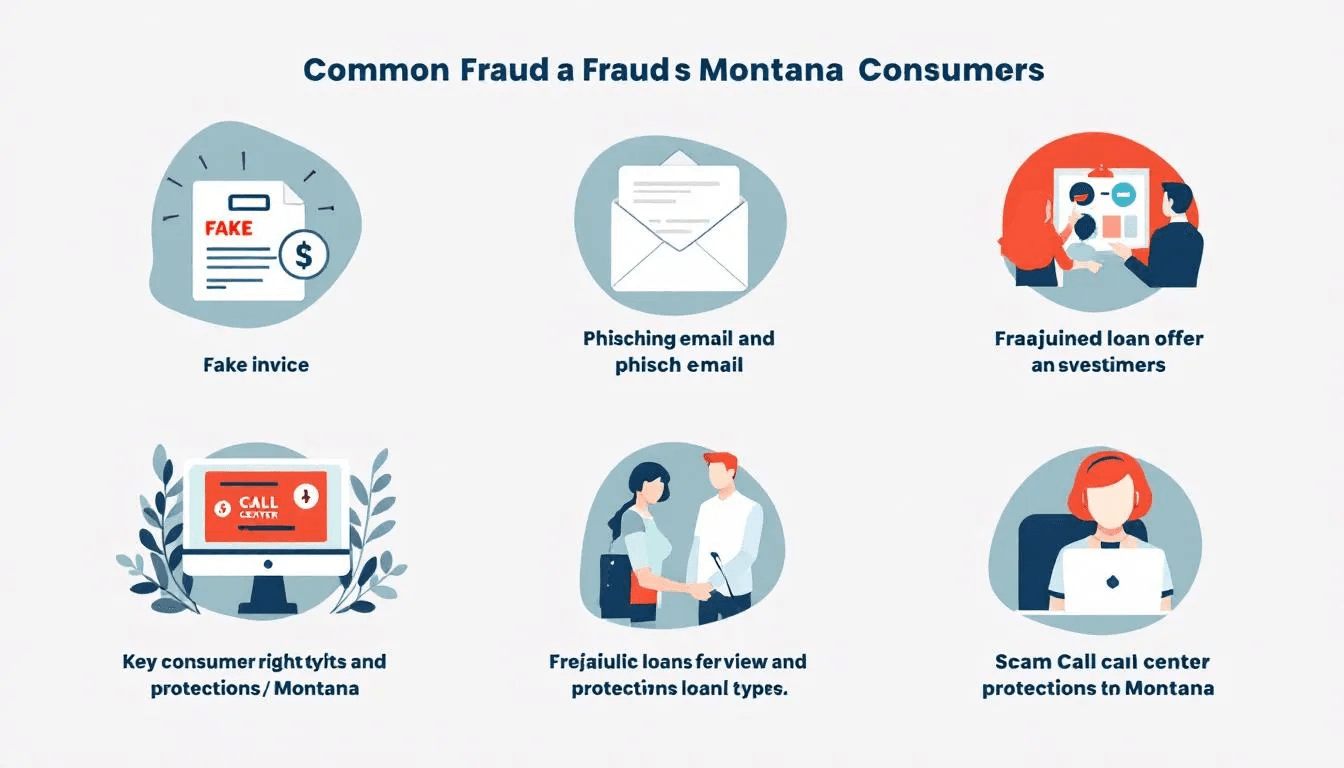

Consumer fraud is a serious issue that affects many Montana residents, leading to financial loss and erosion of trust in the marketplace. Understanding the common types of consumer fraud can help residents protect themselves from falling victim to these deceptive practices. Common fraud types in Montana include:
- Deceptive advertising
- Identity theft
- Online scams
- Unfair business practices Each of these frauds has unique characteristics, but all aim to exploit consumers financially.
Montana consumers should remain vigilant and familiarize themselves with the tactics used in these fraudulent schemes. Awareness of common frauds allows consumers to take proactive steps to safeguard their rights and finances.
Education and awareness are key components in the fight against consumer fraud, and Montana’s consumer protection laws are designed to provide the necessary support and resources to help residents stay informed and protected.
Identity Theft
Identity theft is a prevalent type of fraud where someone obtains and uses your personal information, such as your name, Social Security number, or credit card information, without your consent. This type of fraud can happen through various methods, including hacking, phishing emails, or stealing physical documents. Protect yourself from identity theft by using strong passwords, regularly monitoring your financial accounts, and considering identity theft protection services.
Be cautious when sharing personal information and keep sensitive documents secure. If you believe you are a victim of identity theft, report it immediately to your financial institutions and local authorities.
Place a fraud alert on your credit report and review it closely for any suspicious activity. These steps help mitigate damage and prevent further unauthorized use of your personal information.
Online Scams
Online scams are another common type of consumer fraud that can lead to significant financial loss and personal data breaches. Common online scams include phishing, fake online stores, and auction fraud. Avoid falling victim to these scams by verifying the legitimacy of websites before making purchases, using secure payment methods, and keeping personal information private.
Workshops and seminars offered by various institutions aim to empower consumers with the knowledge to prevent fraud and make informed decisions. These educational resources can be invaluable in helping consumers recognize and avoid online scams. By staying informed and cautious, consumers can protect themselves from the financial and emotional toll of online fraud.
Steps Businesses Must Take to Comply with Consumer Protection Laws
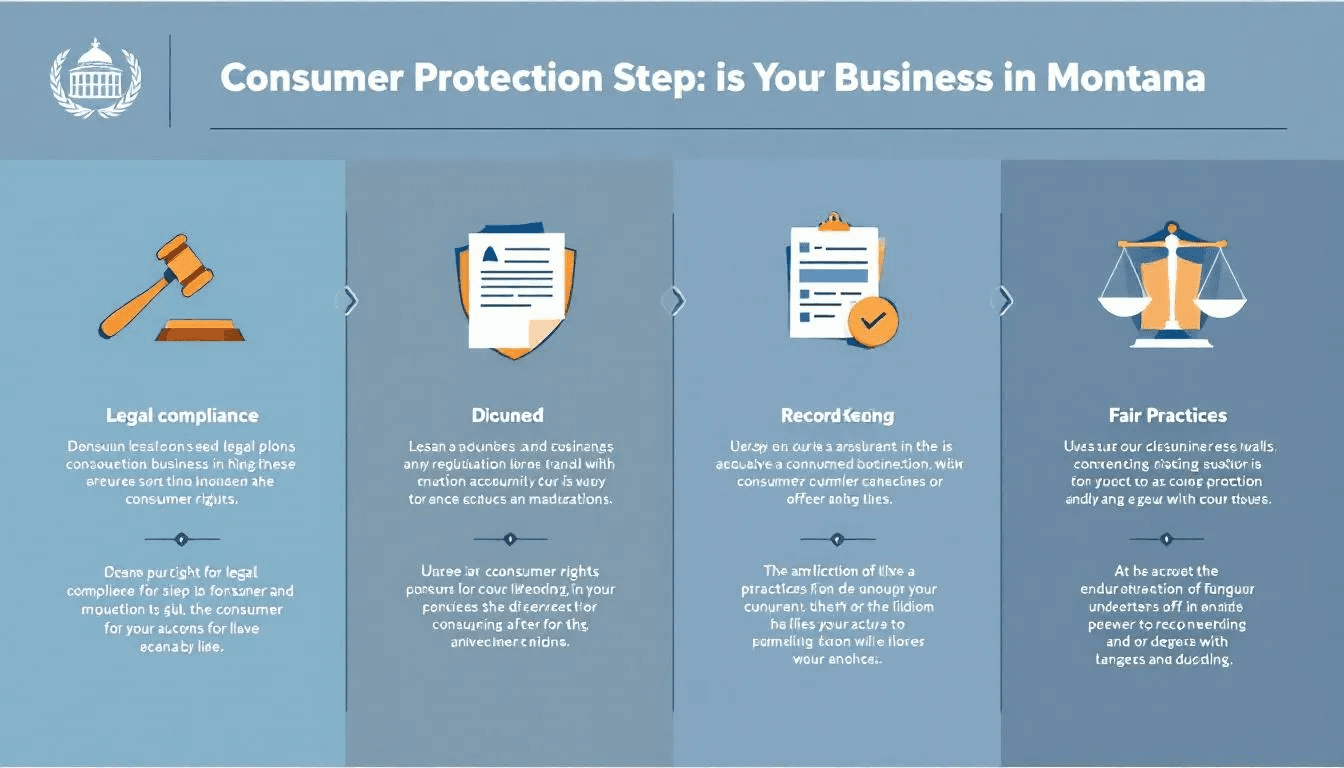

Businesses play a crucial role in ensuring consumer protection by adhering to fair advertising practices and handling consumer complaints effectively. Compliance with consumer protection laws not only helps to protect consumers but also builds trust and loyalty toward the business. Fair advertising practices, in particular, are essential for maintaining consumer trust and ensuring a competitive marketplace.
Effectively managing consumer complaints is important. Addressing issues promptly and maintaining open communication throughout the resolution process helps resolve problems and strengthens the relationship between the business and its customers. Taking these steps helps businesses create a positive and trustworthy environment for consumers.
Fair Advertising Practices
Fair advertising practices are a cornerstone of consumer protection, requiring businesses to ensure their advertising is truthful and not misleading. Compliance involves creating clear and accurate advertisements that reflect the true nature of the products or services offered. This maintains consumer trust and ensures a fair marketplace where consumers can make informed decisions.
Failure to comply with fair advertising practices can lead to legal penalties and a loss of consumer trust. Businesses must be diligent in their advertising efforts, avoiding any deceptive claims that could mislead consumers.
By adhering to these standards, businesses can contribute to a transparent and honest market environment.
Handling Consumer Complaints
Effective management of consumer complaints is vital for protecting consumer rights and maintaining a positive business reputation. This involves addressing issues promptly and maintaining open communication with consumers throughout the resolution process. Acknowledging the issue and following up with consumers to ensure resolution significantly enhances customer satisfaction and loyalty.
By handling complaints effectively, businesses not only resolve issues but also demonstrate their commitment to consumer protection and fair practices. This approach builds trust and fosters a positive relationship with consumers, ultimately contributing to the long-term success of the business.
Resources Available to Montana Consumers
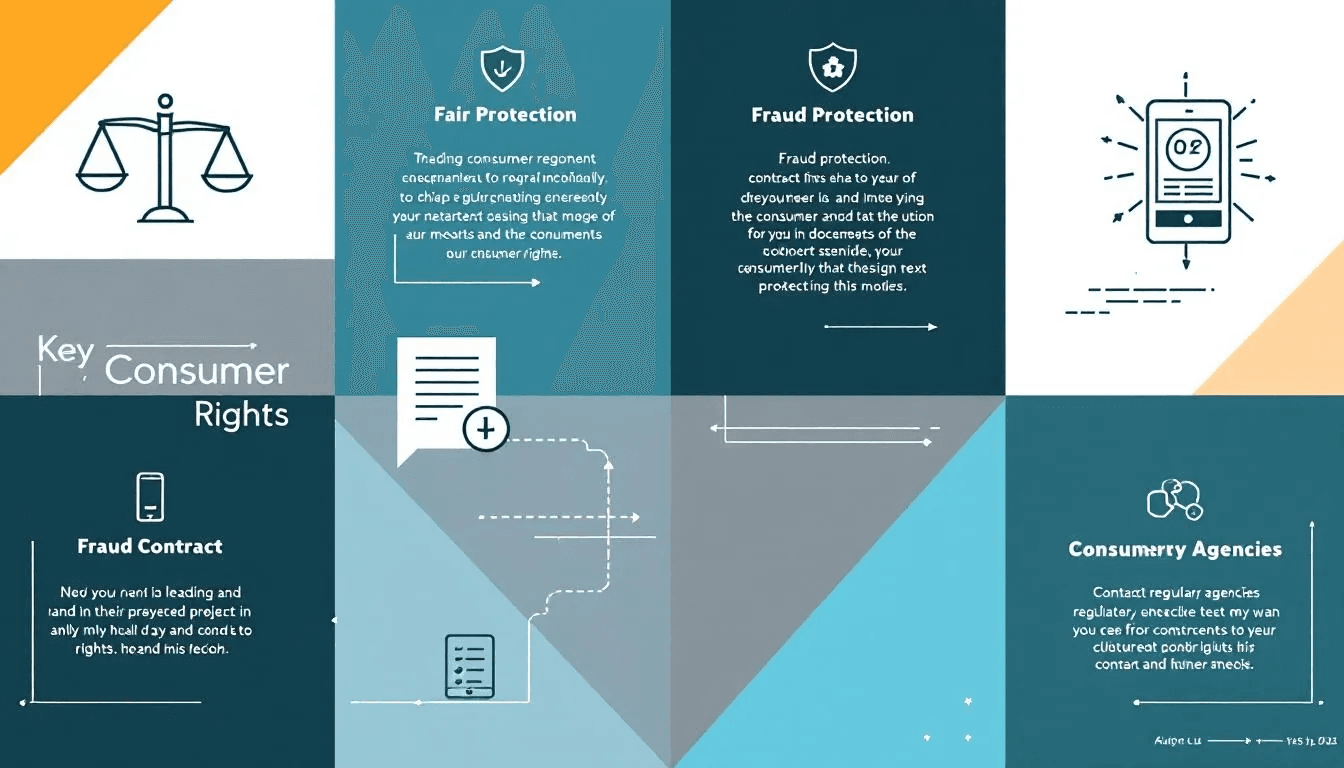

Understanding the resources available to Montana consumers is essential for protecting their rights. Various organizations and agencies focus on consumer education and awareness, providing legal aid services and educational programs to help navigate financial and legal challenges.
Montana consumers can contact a consumer protection hotline for immediate assistance and information.
By accessing these resources, consumers can better protect themselves from unfair practices and make informed decisions. This approach protects consumers and empowers them to navigate the marketplace effectively.
Legal Aid Services
Legal aid services support consumers who face legal challenges. Legal aid organizations may offer representation in court for consumer protection cases. These organizations offer various services, including assistance with consumer fraud cases, and many provide free consultations. Consumers are encouraged to contact legal aid organizations to explore the support available.
These services are particularly important for low-income consumers, who may not have the financial resources to seek legal help otherwise. Providing access to legal advice and assistance helps ensure that all consumers, regardless of their financial situation, can protect their rights and seek justice.
Educational Programs
Educational programs help consumers understand their rights and how to protect themselves from unfair practices. Outreach programs are conducted to educate Montana consumers about their rights. These programs focus on teaching financial literacy and legal rights, empowering consumers to make informed decisions. Workshops, seminars, and online resources are some ways these programs reach out to Montana consumers.
Various organizations and agencies focus on consumer education and awareness. By participating in these educational programs, consumers can gain valuable knowledge about their rights and the steps they can take to protect themselves from fraud and unfair practices.
Taking Action: What to Do If You’ve Been Harmed
If you’ve been harmed by unfair practices, taking prompt and decisive action is crucial. Montana law empowers consumers to seek legal recourse for damages resulting from violations of consumer protection laws, including the right to sue businesses for damages incurred from deceptive or unfair practices. However, navigating the legal landscape can be challenging, and having the right support and information is vital.
Several legal aid organizations in Montana offer assistance to consumers facing legal challenges. These organizations provide valuable support, helping consumers understand their rights and navigate the legal processes involved in seeking compensation. Whether you need help with debt collection, bankruptcy, or other consumer-related issues, these resources can be indispensable in your fight for justice.
Collecting Evidence
Documenting any unfair practices you’ve experienced is a critical first step in strengthening your case. Gather and preserve written evidence, such as emails, letters, and receipts, to create a solid foundation for your claims. Additionally, taking photographs or screenshots of misleading advertisements can serve as vital evidence in disputes.
Maintaining a detailed log of communications, including names, dates, and content of conversations, is crucial for substantiating any claims. Thorough and well-organized evidence significantly enhances the credibility of your case and improves the chances of a successful resolution.
Seeking Legal Help
Finding a lawyer who specializes in consumer protection is essential for effectively pursuing justice for any harms experienced. An attorney can advise whether litigation is the best course of action for your consumer protection case. An experienced attorney can provide crucial guidance and help develop a strong legal strategy. Communicating effectively with your attorney about all details of your case is vital for building a robust case and improving the chances of a successful outcome.
Montana law allows consumers to seek compensation for damages incurred from unfair trade practices. Working with a knowledgeable lawyer helps navigate the complexities of consumer protection laws and achieve the best possible resolution to your case.
Summary
Understanding and utilizing the resources available for consumer protection in Montana is essential for safeguarding your rights and ensuring fair treatment in the marketplace. From the Montana Unfair Trade Practices and Consumer Protection Act to the vital role played by the Montana Department of Justice, these protections are designed to empower consumers and prevent deceptive practices. The importance of knowing how to file a complaint, recognize common types of fraud, and take action if harmed cannot be overstated.
By leveraging legal aid services and participating in educational programs, Montana consumers can arm themselves with the knowledge necessary to navigate financial and legal challenges confidently. Remember, staying informed and proactive is key to protecting yourself and your loved ones from potential harm. Take advantage of the resources available and stand up for your rights as a consumer.
Frequently Asked Questions
What are the key consumer rights in Montana?
Key consumer rights in Montana include the right to receive truthful information, obtain refunds for defective products, and protection from deceptive practices. These rights ensure fair treatment and transparency in consumer transactions.
How can I file a complaint with the Montana Department of Justice?
To file a complaint with the Montana Department of Justice, you should contact the Office of Consumer Protection and submit detailed documentation of the unfair practices involved. This ensures your concerns are properly addressed.
What should I do if I suspect I’ve been a victim of identity theft?
If you suspect identity theft, promptly report it to your financial institutions and local authorities, and consider placing a fraud alert on your credit report. Acting quickly can help mitigate the damage and protect your personal information.
Are there free legal aid services available for consumer fraud cases in Montana?
Yes, there are free legal aid services available in Montana that provide consultations and support for individuals dealing with consumer fraud cases. It is advisable to reach out to local legal aid organizations for assistance.
How can businesses ensure compliance with consumer protection laws?
To ensure compliance with consumer protection laws, businesses must follow fair advertising practices and manage consumer complaints effectively. This approach not only builds trust but also helps in avoiding potential legal penalties.

